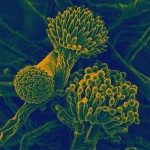Présentation
The enhanced responsiveness observed in human monocytes and mediated by β‑glucan priming is directed towards several other pathogens that are not obligatory fungal-related. This enhanced responsiveness coined training is translated by increased pro-inflammatory cytokines secretion upon re-stimulation, increased ROS, MAPK signalling and NFkB activation (Quintin, 2012; Saeed, 2014). β‑glucan training generate a metabolism shift toward increased aerobic glycolysis and decreased oxidative phosphorylation, a phenomenon reminiscent of the Warburg effect (Cheng, 2014). In addition, β‑glucan‑trained monocytes display increased activation markers for Macrophages type 1 and Macrophages type 2, arguing against simple skewing of macrophage differentiation, and more likely for a global increase in macrophage function (Quintin, 2012). It is therefore clear that β‑glucan do not only create super-inflammatory macrophages but rather imprint a ready-to-use macrophages with pleiotropic enhanced functions. With this respect, we investigate whether β‑glucan imprinting could also affect the feature and function of differentiating macrophages. We hypothesize that β‑glucan has very complex and homeostatic influence on diverse types of macrophages with an important asset on the inflammatory feature of the cells. Determining the mechanism by which β-glucan can influence the polarisation of differentiated cells will provide mechanistic tools to help build therapeutic strategies in the future.



